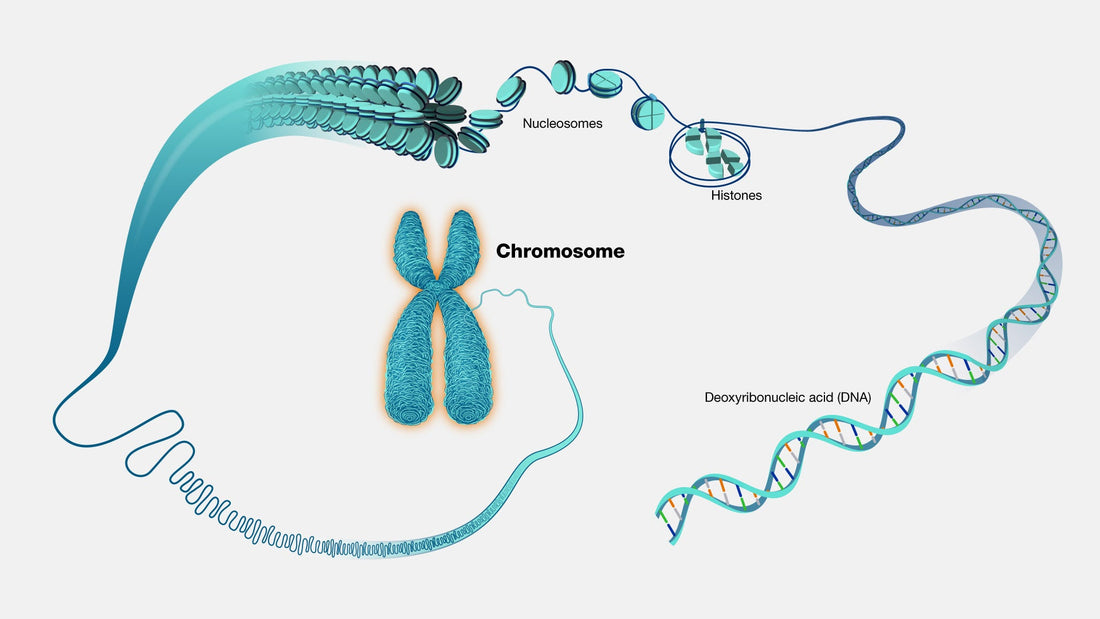
How Your Sex Chromosomes May Influence Heart Disease Risk
Share
Cardiovascular disease (CVD) is the number one cause of death worldwide. It includes conditions like heart attacks, strokes, and heart failure. While lifestyle factors such as diet, exercise, and smoking play a big role, there’s growing evidence that our biology—including our sex chromosomes—can also influence heart disease risk.
Traditionally, differences in heart disease between men and women have been explained by hormones like estrogen and testosterone. But scientists are now discovering that sex chromosomes—the X and Y chromosomes that determine our biological sex—also have a direct impact on heart health.
What Are Sex Chromosomes?
Everyone has 46 chromosomes in most cells. Among these, two are sex chromosomes: females typically have two X chromosomes (XX), and males have one X and one Y chromosome (XY). These chromosomes don’t just determine reproductive traits—they also affect how genes work throughout the body, including in the heart and blood vessels.
The Y Chromosome and Heart Risk in Men
In men, one key finding is the mosaic loss of the Y chromosome (mLoY). This means some cells in a man's blood lose their Y chromosome over time. It becomes more common with age and smoking. Research has linked mLoY to a higher risk of heart problems like heart failure, atrial fibrillation, and even earlier death.
Scientists believe this happens because the Y chromosome plays a role in controlling inflammation and immune responses. When the Y chromosome is lost, immune cells may become more harmful, leading to damage and scarring (fibrosis) in the heart.
The X Chromosome’s Hidden Influence
The X chromosome is larger and carries more genes than the Y. In women, one of the two X chromosomes is usually “turned off” in each cell to balance gene activity—a process called X chromosome inactivation (XCI). But this inactivation isn’t perfect. Some genes on the “off” X chromosome still get expressed, a process called XCI escape.
This means women may produce more of certain proteins than men, which could protect against some types of heart disease. However, in some cases, it may also lead to higher risk of blood clots or other issues.
Another process, called XCI skewing, happens when one X chromosome is much more active than the other. It’s been linked to a higher risk of artery problems in some women.
What Does This Mean for You?
These findings highlight the importance of personalized medicine. Men and women may need different approaches to prevent and treat heart disease—not just because of hormones or lifestyle, but because of deep-rooted genetic differences.
For example:
- Men with high heart risk might benefit from tests that detect mLoY early.
- Women with a family history of certain X-linked disorders might need extra screening for heart complications.
Looking Ahead
While this research is still evolving, it opens the door for more tailored healthcare. Doctors could one day use your sex chromosome profile to predict your heart disease risk more accurately—and even guide specific treatments.
In the meantime, no matter your genetic makeup, some advice is universal:
- Eat a heart-healthy diet
- Exercise regularly
- Avoid smoking
- Manage your blood pressure, cholesterol, and blood sugar
- Get regular checkups
Final Thoughts
Our sex chromosomes do more than determine if we are male or female—they also help shape our risk for diseases like heart conditions. As science learns more, we’ll be better equipped to prevent and treat heart disease based on our unique biology.
